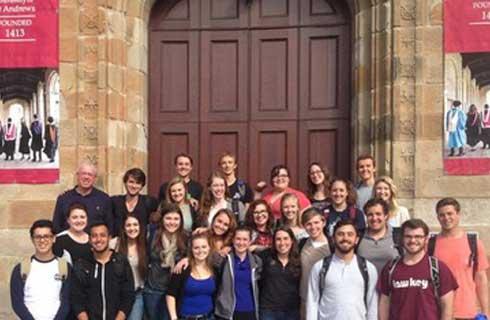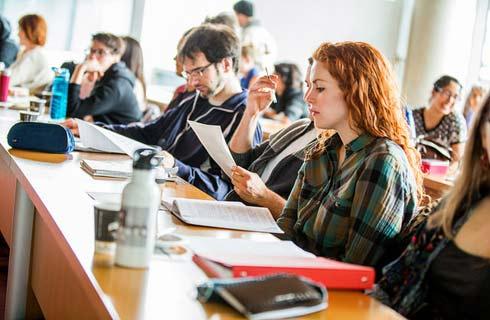微生物宿主相互作用哲学博士
Doctor of Philosophy in Microbe Host Interactions

学历文凭
Ph.D.

专业院系
Department of Pathology, Microbiology and Immunology

开学时间

课程时长

课程学费

国际学生入学条件
Qualified applicants with bachelor’s or comparable non-U.S. degrees are eligible for admission to the Graduate School. Applications from international students with three-year bachelor’s degrees will also be considered.
The minimum acceptable score on the paper-based TOEFL is 570, and for the Internet-based test, 88. Many programs, however, require a considerably higher level of proficiency.
For IELTS, the minimum acceptable score will vary by program. In many cases, a score of at least 7.0 is desirable.
IDP—雅思考试联合主办方

雅思考试总分
7.0
- 雅思总分:7
- 托福网考总分:88
- 托福笔试总分:570
- 其他语言考试:NA
CRICOS代码:
申请截止日期: 请与IDP联系 以获取详细信息。
课程简介
Through new discoveries and state-of-the-science training of future scientists, the Microbe-Host Interactions Ph.D. graduate program strives to be a world-class center of excellence in biomedical research. The program's mission evolved from the realization that while we cannot imagine our global village without germs, we can imagine a world without preventable and treatable microbial diseases. Our focus is to train students to define the interactions between microbes'specifically, bacteria and virusesand their host organisms that lead to disease or promote health.<br><br>Researchers in the Microbe-Host Interactions (MHI) program, supported by the Department of Pathology, Microbiology and Immunology, have developed innovative in vivo and in vitro systems to study basic mechanisms of bacterial and viral pathogenesis. A key direction in the Department is to use the information garnered from mammalian and microbial genomes projects to identify new genes that control the infection process and affect clinical outcomes.<br><br>The MHI program is designed to equip each student with an in-depth understanding of their particular discipline (e.g. bacterial pathogenesis or virus replication), while imparting a knowledge of host biology sufficient for understanding pathogen-host interactions. As a research training program, MHI emphasizes training in the fundamental principles that underlie hypothesis-driven research. The program also offers numerous opportunities to attend seminars by world-class researchers and to discuss recent scientific developments in various journal clubs.
相关申请
 预科
预科 奖学金
奖学金 实习机会
实习机会 在校学习
在校学习 跨境学习
跨境学习 校园授课-线上开始
校园授课-线上开始 在线/远程学习
在线/远程学习
开学时间&学费
学费信息仅供参考,请与IDP联系以获取详细信息
| 开学时间 | 时长 | 学费 | 地点 |
|---|
学校排名

世界排名121
数据源:
泰晤士高等教育世界大学排名
关于范德堡大学

严格学术问题的前提美国范德堡大学要求男生在观看足球比赛时穿西装、打领带,女士佩戴珍珠,并且要求一名异性同伴。虽然在一次赛事上不必满足所有的要求,但美国范德堡大学已经将南部的优雅和现代社会的态度成功结合在了一起。设立于1875年的honor code管理的所有学术活动,也使得范德堡的学生可以在没有监考的情况下进行考试。 这里几乎所有的人都可以找到自己想要的东西和美国的音乐之城毗邻,这里有蓝调、乡村和摇滚音乐以及各式各样的餐馆、剧院和出售自制啤酒的酒馆,从校园步行即可到达。乡村音乐粉丝们绝对不应该错过的是这里的名人纪念堂。纳什维尔的边界之外是大雾山、提供野炊设施的州立公园、美丽的湖泊和冬天滑雪场。最好的公路旅行线路包括到孟菲斯(埃尔维斯的家乡)、新奥尔良(参加狂欢节)、路易斯维尔(肯塔基州赛马会)和亚特兰大。
本校相关课程
其他相关课程

微生物学和免疫学哲学博士
 麦吉尔大学继续教育学院
麦吉尔大学继续教育学院学历文凭
Ph.D.
开学日期
课程费用总额


微生物学和免疫学理学硕士(论文)
 麦吉尔大学继续教育学院
麦吉尔大学继续教育学院学历文凭
Masters Degree
开学日期
课程费用总额


微生物学和免疫学理学学士学位(荣誉学位)
 麦吉尔大学继续教育学院
麦吉尔大学继续教育学院学历文凭
Bachelor Degree with Honours
开学日期
课程费用总额


微生物学和免疫学理学学士
 麦吉尔大学继续教育学院
麦吉尔大学继续教育学院学历文凭
Bachelor Degree
开学日期
课程费用总额


免疫学理学学士(荣誉学位)
 麦吉尔大学继续教育学院
麦吉尔大学继续教育学院学历文凭
Bachelor Degree with Honours
开学日期
课程费用总额


免疫学哲学博士
 卡尔加里大学
卡尔加里大学学历文凭
Ph.D.
开学日期
课程费用总额










 美国
美国





